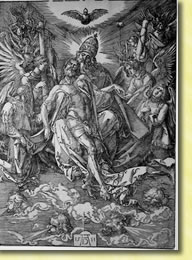This is the first sermon I preached right after The Episcopal Church’s General Convention 2003. At the time, I was an aspirant for Holy Orders in the Episcopal Diocese of Connecticut. Within a month I had withdrawn from the ordination process. Two years later, on July 13, 2005, Bishop Andrew Smith invaded St. John’s Episcopal Church, changed the locks and deposed Mark Hansen, our priest, and imposed a priest-in-charge, who later removed those of us on the vestry for “numerous offenses” (unspecified).
I now live in the Anglican Diocese of Pittsburgh, and Archbishop Robert Duncan is my bishop. With the inaugural meeting of the new Anglican Church of North America this week, of which I am a member, I thought it appropriate to repost this sermon.
Psalm 147
Eph. 5: 15-20
John 6:53-59
 At General Convention 2003, the Episcopal Church made two decisions that have put the Anglican communion in an uproar. They decided to ordain an Episcopal priest who had divorced his wife, and has been living in an ongoing homosexual relationship with another man, and they decided to allow individual dioceses to provide rites of blessing for homosexual relationships, at the discretion of the local bishop. The issue of controversy in the Episcopal Church today has to do with a disagreement about ethics or morality. So I have decided to talk a little this morning about Christian ethics.
At General Convention 2003, the Episcopal Church made two decisions that have put the Anglican communion in an uproar. They decided to ordain an Episcopal priest who had divorced his wife, and has been living in an ongoing homosexual relationship with another man, and they decided to allow individual dioceses to provide rites of blessing for homosexual relationships, at the discretion of the local bishop. The issue of controversy in the Episcopal Church today has to do with a disagreement about ethics or morality. So I have decided to talk a little this morning about Christian ethics.
The first thing that I think needs to be said is that it is quite difficult today to think about ethics from a Christian perspective, even for those inside the Church. The reason for this is that there is a competing ethic in our culture that has nothing to do with Christianity, but which we can hardly avoid. This is an ethic that has so permeated our culture that even Christians fall into its ways of thinking. I am going to refer to this as the “do-it-yourself” ethic. “Doing-it-yourself” is the idea that morality is about doing the best you can—pulling yourself up by your boot straps. If you do the best you can, you’ll be all right.
This “do-it-yourself” ethic comes in two varieties, a conservative variety and a liberal variety. The conservative variety aims for perfection. The conservative “do-it-yourselfer” does not allow for any failures, and tolerates no half-hearted efforts. Sometimes this view is called moralism or Puritanism. The liberal “do-it-your-selfer” is more tolerant. He realizes that not everybody is perfect, so he thinks that God grades on a curve. As long as you try, you get an A for effort.




